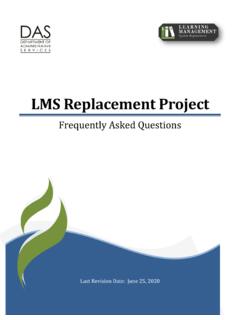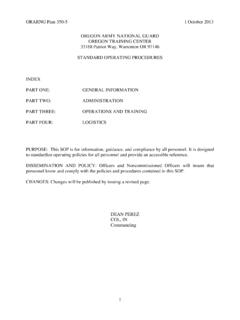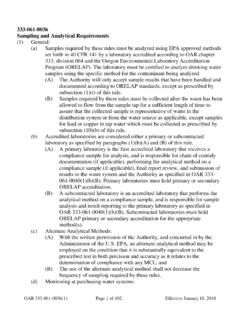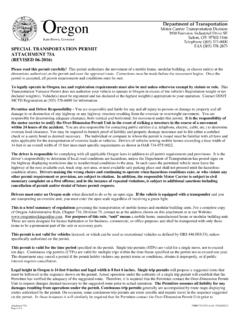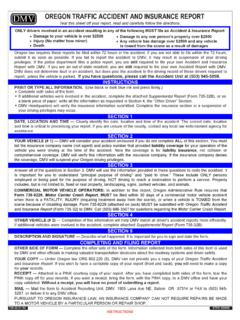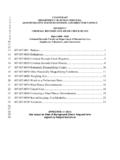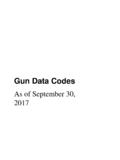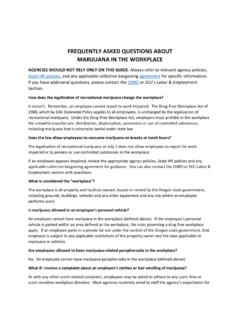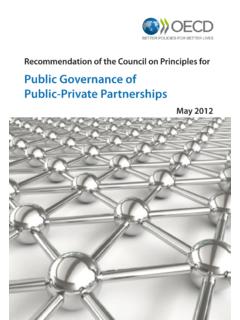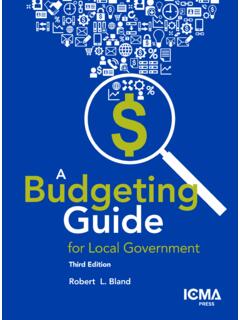Transcription of Local Budgeting Manual - Oregon
1 Local Budgeting ManualProPerty tax Division150-504-420 (Rev. 05-12)3 150-504-420 (Rev. 05-12)table of contentstitle PageWhat s new in this edition? ..4 Introduction ..5 Chapter 1 Who is involved in the budget process? ..7 Chapter 2 Formation, dissolution, and boundary changes ..12 Chapter 3 The budget process ..13 Chapter 4 Types of funds ..19 Chapter 5 Estimating budget resources and requirements ..22 Chapter 6 Property taxes in 7 Estimating property taxes available as a budget resource ..40 Chapter 8 The budget committee and approving the budget ..44 Chapter 9 Publication requirements ..47 Chapter 10 Tax elections ..52 Chapter 11 The budget hearing and adopting the budget ..55 Chapter 12 Certifying taxes imposed ..62 Chapter 13 Budget changes after adoption ..65 Chapter 14 Biennial budgets ..73 Appendix A Glossary ..78 Appendix B Statutory and administrative rule references.
2 83 Appendix C Taxing authority, by type of Local government ..86 Appendix D Permanent rate limits ..91 Appendix E Community college Local option limits ..108 Appendix F Chapter 294 renumbering table ..109 Index ..111 Questions?on the internet .. By telephone ..503-945-8293 By e-mail .. @ en espa ol: Salem ..503-378-4988 Gratis de prefijo de Oregon ..1-800-356-4222tty (hearing or speech impaired; machine only): Salem ..503-945-8617 Toll-free from an Oregon prefix ..1-800-886-7204americans with Disabilities act (aDa): Call one of the help numbers for information in alternative (Rev. 05-12) 4 What s new in this edition?This edition of the Local Budgeting Manual has fairly extensive revisions from earlier editions. The last com-prehensive update to the Local Budget Laws was in 1963. In 2009 a workgroup convened to address problems of duplication and inconsistencies that had crept into the statutes. The workgroup focused on changes to clarify policy and make the statutes easier to follow.
3 They also recommended reordering existing statutes to make the progression more logical. The result was HB 2425, passed in 2011, which took effect January 1, 2012. Of the 53 current statutes, three were repealed, three were added, 15 retain their existing numbers, and 38 have been changesThe significant changes adopted in HB2425 are:appropriations: Capital outlay may be a part of an organizational unit or program total; Changes caused by reduction of resources moved to statute for supplemental budgets; Schools and ESDs appropriate by Oregon Department of Education functions; and Community colleges appropriate by ODE functions, CCWD functions, or by program or to Local budget law: Appropriation of specific purpose grant money by resolution is no longer restricted to grants received in the same year; Rewritten to emphasize that non-tax money is required for unforeseen occurrence exception to apply; No public hearing needed to re-appropriate money received from the return of purchased transfers: Limit of 15% on contingency that can be transferred by resolution to an expenditure line item is based on the original adopted budget, not the budget as amended since adoption; Pass-through payments moved to a new statute for budgets: Expenditures increased under ORS do not require a supplemental budget; Supplemental budget required because of reduced resources is subject to same 10% threshold for public hearing; Supplemental budget in which no fund changes more than 10% can be adopted at a regular meeting of the governing body (no public hearing required), but meeting notice must state that a supplemental budget will be considered; Major supplemental budget changes (where any one fund changes more than 10%) moved into their own statutory section (ORS ).
4 Public hearing required, with published notice and summary of funds that change more than 10%.As a result of these changes, several forms have changed or been made obsolete. The Notice of Budget Hearing Forms (LB-1, ED-1, and UR-1) have been updated to include more information. The Forms LB-2, LB-3, and LB-4 (and the corresponding ED and UR forms) are now obsolete and no longer necessary or the 2011 Oregon Laws are published, the Local Budget Law statutes will be reordered to more logically flow through the Budgeting process. Throughout this Manual we have included both the new statute numbers and the old ones. A crosswalk table is included in the Appendix for ease of 150-504-420 (Rev. 05-12)introductionMost Local governments1 in Oregon , from the smallest cemetery district to the largest city, must prepare and adopt an annual budget. Schools, education service districts, community colleges, counties, cities, urban re-newal agencies, and most special districts are all subject to the same budget s Local Budget Law is found in Oregon Revised Statutes (ORS) to The full text of these statutes can be found on the Oregon Legislature web site at law sets out several specific steps that must be followed during the Budgeting process.
5 The process must begin far enough in advance that it can be followed and the budget adopted before June 30 of the current fis-cal year or the last June 30 of the current biennial budget period. Without a budget for the new fiscal period in place, the Local government s authority to spend money or incur obligations expires on June 30. A Local govern-ment s ability to impose a property tax is also contingent on following the Budgeting process. Compliance with Local Budget Law is critical for Local is a budget?A budget is a financial plan containing estimates of revenues and expenditures for a single fiscal year or bien-nial budget allows a Local government to evaluate its needs in light of the revenue sources available to meet those needs. A complete budget justifies the imposition of property taxes and the making of the appropriations that give the government its authority to spend public of Local budget lawBudgeting is not simply something a Local government does once every year or two.
6 It is a continuous process, taking 12 or 24 months to complete a cycle. The Budgeting process has four parts. The budget is: 1) prepared, 2) approved, 3) adopted, and 4) executed. After adopting the budget, the governing body makes the necessary appropriations and certifies to the county assessor the tax to be s Local Budget Law has several important objectives (ORS ): To establish standard procedures for the preparation, presentation, administration and appraisal of bud-gets of municipal corporations; To provide for a brief description of the programs of a municipal corporation and the fiscal policy which is to accomplish these programs; To provide estimates of revenues, expenditures and proposed taxes; To provide specific methods for obtaining public views in the preparation of fiscal policy; To provide for the control of revenues and expenditures for the promotion of efficiency and economy in the expenditure of public funds; and To enable the public, taxpayers and investors to be apprised of the financial policies and administration of the municipal corporation in which they are involvementTo give the public ample opportunity to participate in the Budgeting process, Local Budget Law requires that a budget officer be appointed and that a budget committee be formed that includes voters from the district.
7 The budget officer draws together necessary information and prepares the proposed budget. The budget com-mittee reviews and may revise the proposed budget before it is formally approved. After the budget committee approves the budget, the governing body publishes a summary of the budget and holds a public hearing, at which any person may appear for or against any item in the budget. These requirements encourage public par-1 Throughout this Manual we use the terms Local government , municipal corporation, taxing district, and district interchange-ably. For most purposes of Local Budget Law the terms have the same few types of special districts are specifically exempted from Local Budget Law. See Chapter 3 for a list of these types of of Budgeting by fiscal year, the governing body of a municipal corporation may adopt a 24-month, or biennial budget. For the differences that biennial Budgeting entails, see Chapter 14-Biennial Budgets. Throughout this Manual , we refer to the budget period as a fiscal year but if a Local government adopts a biennial budget, the period referred to is a 24-month (Rev.)
8 05-12) 6ticipation in budget making. They also give public exposure to budgeted programs and fiscal policies before the governing body adopts the involvement in the budget cycle varies from one community to another. It is up to each Local govern-ment to prepare a budget that clearly outlines its fiscal policies for the patrons of the district. If a budget is clear and concise, taxpayers have a better understanding of what services their tax dollars are buying. Local govern-ments may find citizen input informative and major steps of the Budgeting process are outlined in Chapter 3. A more complete outline of the budget process, with cites to specific Oregon Revised Statutes and Oregon Administrative Rules, is in Appendix 150-504-420 (Rev. 05-12)Chapter 1 Who is involved in the budget process?Many state and Local agencies and organizations are involved in the budget process.
9 This chapter provides an overview of the duties and responsibilities of Oregon Department of revenueThe authority of the Department of Revenue for its oversight role in the Budgeting process is found in ORS to ORS ORS gives to the department sole authority to interpret and administer Lo-cal Budget Law and to issue administrative rules for compliance. This statute also gives the department author-ity to ensure compliance with all other laws relating to the imposition of property taxes. However, ORS prohibits the department from interfering with the fiscal policy of any Local government . Local Budget Law is complex and ever-changing. It is important that Local governments stay informed of law changes and other requirements. Anyone with questions about these laws can contact the Department of Revenue for help at 503-945-8293 or by e-mail at @ rulesWhen a statute is unclear or does not provide sufficient detail for the smooth functioning of the property tax system, the department sometimes adopts an Oregon Administrative Rule (OAR).
10 The process for adopting or amending administrative rules provides for consultation among the department s affected program areas, col-laboration with interested persons, both public and private, review by legal counsel, management review, and a public hearing. The general rulemaking procedures are found in ORS to Once adopted, an OAR has the force of law of a statute adopted by the Oregon Legislature, and the department must follow the terms of the rule. The administrative rules for Local Budget Law can be found at u le s/OAR S _10 0/OAR _150 m such as this Manual provide detailed Budgeting guidelines and statutory interpretations. The Basic Budget Book is a simpler guideline designed for the first-time budget officer. It walks through the basic steps for preparing a budget. Local Budgeting in Oregon , an overview of the Budgeting process, is especially designed for the public and for budget committee members. Information circulars, distributed through county assessors offices, provide information on specific issues.
